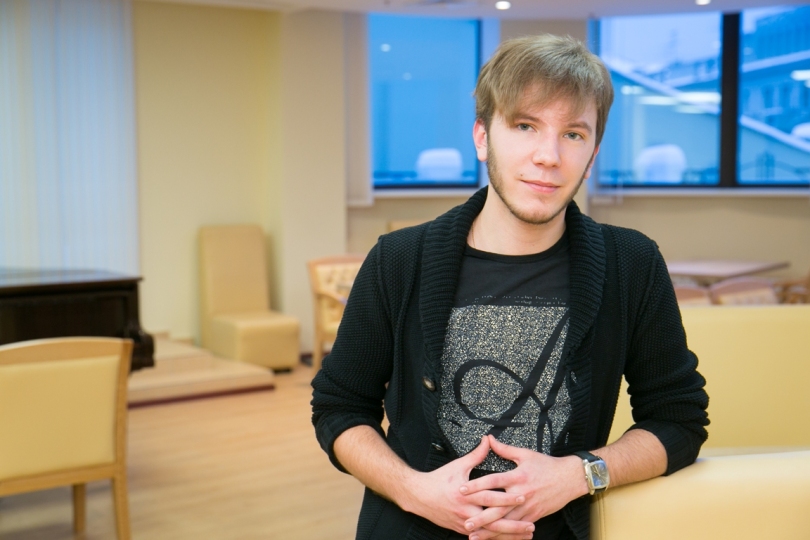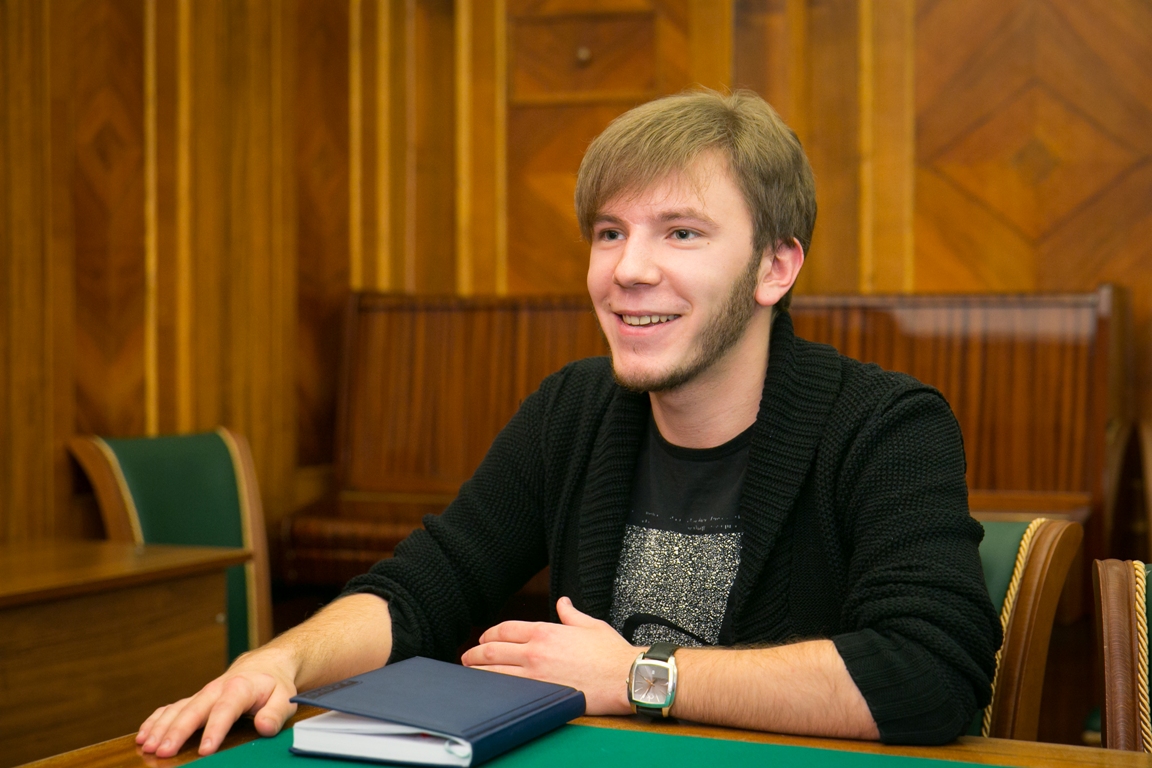'I Want to Convince Students that Having an Ombudsman Is Helpful and Effective'

In December 2015, HSE elected its first Student Ombudsman — master’s student Ivan Chernyavsky. In an interview with HSE, Ivan talks about his upcoming plans, as well as the problems that he already faces in his new role as Ombudsman.
— Why did you decide to participate in the Ombudsman elections?
— I had already been a part of student government since November 2013, and since then I have graduated from the Faculty of Law and started my master’s programme in Integrated Communications. Throughout all of 2015, I said, ‘that’s it, we just need to carry out elections to the new university-wide student council and I’ll be quiet.’ I wanted to make student government at HSE clear, understood, and something that represented the interests of voters once and for all. But then, during elections for the new ‘big’ student council, the idea came about to create a new wing, as well as the role of Student Ombudsman. Initially, there wasn’t anyone eager to take on this position, at least among the people who could be considered able to ‘endure’ the newly created role. Then a lot of people, especially those from student government, started telling me to go for it myself. I declined. Then I called my parents, and it turned out that they had read an article in Kommersant about how HSE was getting a Student Ombudsman, and my dad asked me if I was going to do it. In the end, weighing all the pros and cons and becoming convinced that I had a team that would be ready to help me with carrying out my future responsibilities, I decided to put my name on the ballot.
— In what way is this personal for you?
— It’s half altruism and half my own personal interest. I think this entire story is helpful both for students, as well as for the development of the university as a whole, and it’s really important how things go the first year. As everyone knows, if you want something done right, do it yourself. But on the other hand, it was really interesting to take part in the elections. Where else in Russia can you take part in a free election? It seems like it’s just a university, but we are really talking about a total of 20,000 people; that is, it’s actually a large municipality. It was interesting to carry out a real campaign. I also really liked the way the new position was set up. Due to school and work, I don’t particularly have time to go to the regular meetings and events that are characteristic of a student council. This is because a student council is a collegial organization that can’t really survive without meetings and long conversations. The Student Ombudsman has a lot of freedom, and I hope that my main job will be resolving specific problems.
Obama’s 2008 presidential campaign is a gold standard, just on a completely different scale. I even used a few of the same tricks
— How intense did the election campaign end up being?
— There weren’t any smear campaigns, so to speak, but there was a lot of action. It was funny when I’d hang up my posters around campus and in the dorms, and two days later my main component’s signs, which were of a similar style but twice as large, would be hung right next to it. We had two completely different strategies. My component decided to take a route that I would describe as ‘aggressive marketing;’ he went around to all the dorms (which house probably half the student body), went around to apartments, talked directly with voters, handed out flyers, etc. I didn’t think this was a bad way of doing it, but it probably wasn’t the best for the HSE atmosphere. I put myself in the voter’s shoes – I study all week, work, and I have just one day when I can lounge around and lie in bed. Then I imagined that someone came to me to tell me about some ombudsman that I’d never heard of before. After imagining such a situation, I decided to carry out my main campaign via social media, and Obama’s 2008 presidential campaign was my gold standard, just on a completely different scale. I even used a few of the same tricks, and they worked out well.
— Because there has never been an ombudsman at a Russian university, how do you envision what you'll do in the role exactly?
— I didn't even really need to think of things like that because starting on day one practically, students started sending me messages of what to do, and this is mostly what I work on. It appears that it’s easier for students to turn to a single individual as opposed to a student council, which has a lot of members. And it’s hard for the uninformed student to understand who exactly he or she has to get in touch with to resolve an issue. But answering requests is a sort of ‘reactive’ activity, and I myself would like to be more active. It’s already possible to pick out the main problem areas to work on. This will allow me to get to the root of the problem and reduce the risk of future complains regarding the same or similar topics.

— What are the problem areas? What do you think needs to be tackled first and foremost?
— I got a wave of messages that always arise this time of year – exam retakes and grade appeals. For example, a student might be denied an appeal, but without a reason for the denial. Most of the time, a grade appeal is legitimate and the instructor had no bad intentions, despite what the student might think. I think we can avoid such misunderstanding and distrust by amending the corresponding appeals regulations.
There’s another issue that’s more complex and difficult to tackle – HSE leadership typically has an apprehensive attitude, but I completely understand the reasoning behind this. What I’m mostly talking about is the presence of a student council representative at grade appeals or retakes. The representative would not, of course, have a say in the actual grade, instead acting as a student advocate of sorts who understands the fine print of appeal and retake procedures. The problem here is that such an advocate might not be well versed in the specific discipline at the heart of the appeal or retake. But I think we can try out such a practice and experiment. This would at least guarantee that students’ due-process rights are being observed. There’s also a conflict of interest issue here – does the student council member want to argue with teachers her or she might end up having at a later time?
I'd like to organize a student rights school
— You talked about how you went to the elections with an entire team. Will this team continue on throughout your time as Ombudsman?
— Without a doubt. I’m proud of my team. I think that HSE has very few self-governing teams that are made up of master’s and post-graduate students, each with his or her own area of expertise. For example, we have one person amending our local acts who does the same thing for one of the government ministries. Our ‘administrator’ also works in HR at one of the big four. We also have a dormitory contact, as well as a scholarship specialist. And there’s an editor and a designer… Overall, my team consists of 10 talented individuals.
— What other projects are you planning to carry out?
— I think HSE students are already able to defend their rights themselves without turning to an Ombudsman or the student council. The main thing is knowing the law and wanting to understand it. It’s like the famous proverb: give a man a fish and feed him for a day; teach a man to fish and feed him for a lifetime. I’d like to do something else though. I really want to organise a student rights school. It was funny – a member of the presidential human rights council called me a proposed an idea that I myself wanted to suggest. Artem Khromov, the Russian student rights Ombudsman, also wanted to organise a student rights school at HSE. We’re working on the project now, and we’re planning to invite other campuses to participate as well. This could also be a way of preparing future student council members and ombudsmen.
— Oh, and it would make teachers and administrators happy knowing that there are now dozens of Chernyavskys…
— Our regulation on how academic performance is to be evaluated isn’t that hard for instructors to follow. I think it’s a matter of habit really. It’s important to tell students right off the bat how grading will take place and things like that. If it’s hard for an instructor to do this, there are teaching assistants who can talk to students about it.
Unfortunately, there are issues with self-governance in Russia, and student government is oftentimes seen as something between the Young Communist League and KVN
— At what point will you know your work as the Ombudsman has been successful?
— Other universities are currently electing their own ombudsmen as well. In that sense, what’s currently happening at HSE is a sort of pilot project that will hopefully serve as an example for the entire country. I’m not sure that all the ombudsmen at other universities will have similar rights and capabilities, as a lot depends on the mindset and corporate culture of a university. Unfortunately, there are issues with self-governance in Russia, and student government is oftentimes seen as something between the Young Communist League and KVN.
My main objective is for students to look back in a year and understand that they did the right thing in voting for an ombudsman, and I want the people who didn’t vote to be convinced that having an ombudsman is helpful and effective, and hopefully they come vote next time. We need to get on track and move forward, but I’m not going to go up for re-election in a year. I have another personal objective as well – help my brother get into HSE.
— Aha, so you’re going to use your administrative resources, so to speak?
— No, I'm just going to use my time for now, and then we're going to prepare for the Unified State Exam and academic olympiads, like all other applicants.
Ivan Chernyavsky
See also:
‘We Want to Make Sure that International Students Have Fulfilling Academic and Personal Lives’
The Council of the International Student Association (CISA) works to ensure that international students can live and study comfortably at HSE University and in Russia in general. At present, CISA consists of nine international students and its Chair. Its current activities include dealing with border closures, arranging vaccinations, and creating information channels for international students.
New HSE Student Council Representatives Aim to Bridge Communication Gap for International Students
In May 2017, representatives of the International Students’ Association Council were elected to the HSE Student Council for the first time. They will serve until February 2018 when a new election will take place. The International Student Association Council (or International Student Council for short) currently consists of five students from CIS and Baltic countries, and three students from other countries.


